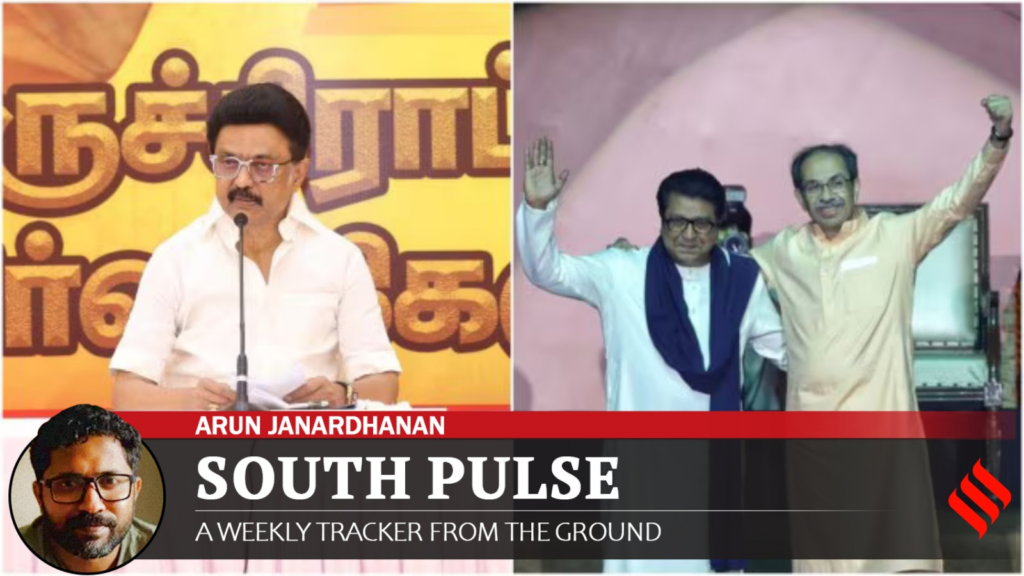In the tumultuous language politics of India, few ironies cut deeper than Tamil Nadu’s ruling DMK hailing the protests against “Hindi imposition” by Shiv Sena factions in Maharashtra.
Just over six decades ago, the then undivided Shiv Sena was among the first political parties to weaponise regional identity in post-Independence India when it targeted South Indians, especially Tamils, in Mumbai, for “stealing” jobs of locals and “refusing to assimilate into Marathi culture”. Sena founder Bal Thackeray was vituperative in his attacks on “Madrasis”, as he dubbed all migrants to the city from South India, fuelling violence against them in Maharashtra in the 1960s and 1970s.
Now, in a moment of political and historical significance, the Shiv Sena (UBT)’s protests against the Centre’s language policy, seen as promoting Hindi, have earned it the praise of none other than Tamil Nadu Chief Minister and DMK chief M K Stalin.
“The language rights struggle waged by the DMK and the people of Tamil Nadu across generations is now spiralling beyond state borders,” Stalin said on Saturday, hailing the “protest storm” in Maharashtra, particularly in the wake of a joint “victory rally” held by Uddhav Thackeray and estranged cousin Raj Thackeray after the Maharashtra government withdrew a government order that seen as promoting Hindi.
Given the Sena’s history, Stalin’s remarks seem little more than transactional in nature. However, it could be built by the Opposition into a resistance against the BJP’s “majoritarian language policy”, cutting across the North-South axis.
Pointing out that “Hindi imposition” was not new to Tamil Nadu, DMK organisation secretary R S Bharathi said, “Our leader (DMK founder and former CM) C N Annadurai said this six decades ago that Hindi imposition is a crucial threat. It’s just that every other state is realising it. We implemented the two-language formula many decades ago, realising this threat of Hindi imposition.”
Tamil Nadu had earlier taken the lead in opposing the Modi government’s New Education Policy (NEP) for its three-language formula, which sees such moves as both unconstitutional and culturally invasive. In Tamil Nadu, the opposition to Hindi goes deeper, to the legacy of the Self-Respect Movement and anti-Hindi agitations dating back to the 1930s. Stalin has been raising the fact that Tamil Nadu has been denied over Rs 2,000 crore in funds for refusing to implement the Centre’s Samagra Shiksha Abhiyan.
Ramu Manivannan, a political scholar who taught Politics at the University of Madras, and is currently working on a book on India’s language debates from the 1940s, termed the alignment politically potent but ideologically awkward. “If Stalin sees this as just another anti-Hindi protest, it is inadequate,” he said. “For Tamil Nadu, language politics is cultural and civilisational. Marathi pride, on the other hand, often flirts with exclusionary populism.”
Manivannan’s reference is to the fact that unlike in Dravidian parties, where Hindi opposition is linked to cultural identity, the Sena’s renewed protests originate as much from Maratha pride as political survival. After a string of electoral defeats, and the looming threat of irrelevance in the coming municipal polls, the Sena (UBT) is looking to consolidate its traditional Marathi vote behind it.
“The language plank offers a way to reconnect with its base, putting a distance between itself and its Maha Vikas Aghadi (MVA) allies,” Manivannan said.
Incidentally, after Stalin’s remarks backing the Sena (UBT), the latter clarified that there was a difference between their stands. Sena (UBT) Rajya Sabha MP Sanjay Raut said Sunday that while the party opposes the Centre’s efforts to make Hindi mandatory in primary education, it does not support a complete rejection of the language.
“The southern states have been fighting for this issue for years. Their stand is against the imposition of Hindi, which means they will not speak Hindi and neither let anyone speak the language. But that is not our stand in Maharashtra. We speak Hindi… Our stand is that the strictness for Hindi in primary schools will not be tolerated,” Raut said.

